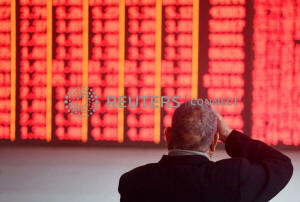|
Growth fears, China equity plunge haunts
world stocks
 Send a link to a friend
Send a link to a friend
 [March 08, 2019]
By Karin Strohecker [March 08, 2019]
By Karin Strohecker
LONDON (Reuters) - Deepening fears for the
health of the global economy pushed world stocks to three week lows on
Friday after China exports contracted by a fifth, sending shares in some
of the country's key indexes more than 4 percent lower.
The February data out of Beijing came in well below expectations of a
4.8 percent drop and worsened the already brittle mood on world markets,
after European Central Bank slashed growth forecasts and unveiled a new
round of policy stimulus on Thursday.
While the timing of the Lunar New Year made it difficult to draw a true
signal from the China data noise, the scale of the drop was alarming,
especially when coupled with sombre new data from Germany and Norway.
The data knocked Chinese stocks off the 20-month highs hit earlier in
the week, with mainland equity indexes plunging more than 4 percent in
their worst day in five months. Japan's Nikkei. closed 2 percent lower.

The dark mood spilled into European stock markets where the STOXX 600
index slipped 0.7 percent, poised for the first weekly drop in a month.
"The trade data from China is a big part of it," said Fiera Capital's
co-chief Investment Officer Julian Mayo.
"Our own view is that the Chinese economy is slower than people
generally think, but I think the world economy is probably slower than
people think. So you put those two together and it is not surprising
that the trade data was weaker than expected."
European auto and financial stocks were at the forefront, both sectors
slipping nearly 2 percent. A surprise decline in German industrial
orders added concerns over the health of China's economy, while
financials nursed losses for a second day after the European Central
Bank cut its growth forecasts and pushed out an interest rate hike.
ECB President Mario Draghi said the economy was in "a period of
continued weakness and pervasive uncertainty" as he pushed out a planned
rate hike and instead offered banks a new round of cheap loans.
MSCI's 47-country benchmark world index dropped for a fifth straight
session - its longest losing streak since December's rout. The pressure
looked to continue on Wall Street, with S&P 500 E-Mini futures easing
0.4 percent.
[to top of second column]
|

A man sits in front of an electronic board showing stock information
at a brokerage house in Hangzhou, Zhejiang province, China December
3, 2018. REUTERS/Stringer

Yet the cocktail of growth woes and dovish central banks proved a
boon for bonds. Germany's benchmark 10-year bond yield took a step
closer to zero percent and both German and French benchmark yields
were at their lowest level since 2016 - the year that saw the ECB
ramp up stimulus and cut rates to fight deflation and weak economic
growth.
"The ECB has had a bullish impact on bond markets and that is set to
continue," said Ciaran O'Hagan, rates strategist at Societe Generale
in Paris. "We were not expecting something so clear, so soon, and
markets were not either, so bond yields are likely to stay low for
longer."
U.S. 10-year Treasury yields touched a fresh two week low 2.627
percent.
On currency markets, the euro inched up to $1.1216 after tumbling 1
percent on Thursday to touch $1.1176 - its lowest since June 2017.
The dollar weakened 0.2 percent after reaching a new 2019 high
against a basket of currencies that includes the euro as traders bet
the United States would fare better than Europe in the coming
months, despite some soft patches in the U.S. economy.
Investors will be scouring U.S. payrolls data for February due out
later in the day, with analysts uncertain how much payback there
might be for January's outsized jump. There was also a chance the
jobless rate could fall by more than forecast, given the recent
strength in employment.
In commodity markets, oil prices eased as U.S. crude output and
exports climbed to record highs, undermining efforts by producer
club OPEC to tighten global markets.
Oil futures fell around $1 with U.S. crude at $55.75 a barrel, while
Brent crude fell to $65.14.
(Reporting by Karin Strohecker in London, additional reporting by
Wayne Cole in Sydney, Dhara Ranasinghe and Marc Jones in London;
Editing by Andrew Cawthorne and Jon Boyle)
[© 2019 Thomson Reuters. All rights
reserved.]
Copyright 2019 Reuters. All rights reserved. This material may not be published,
broadcast, rewritten or redistributed.
Thompson Reuters is solely responsible for this content. |